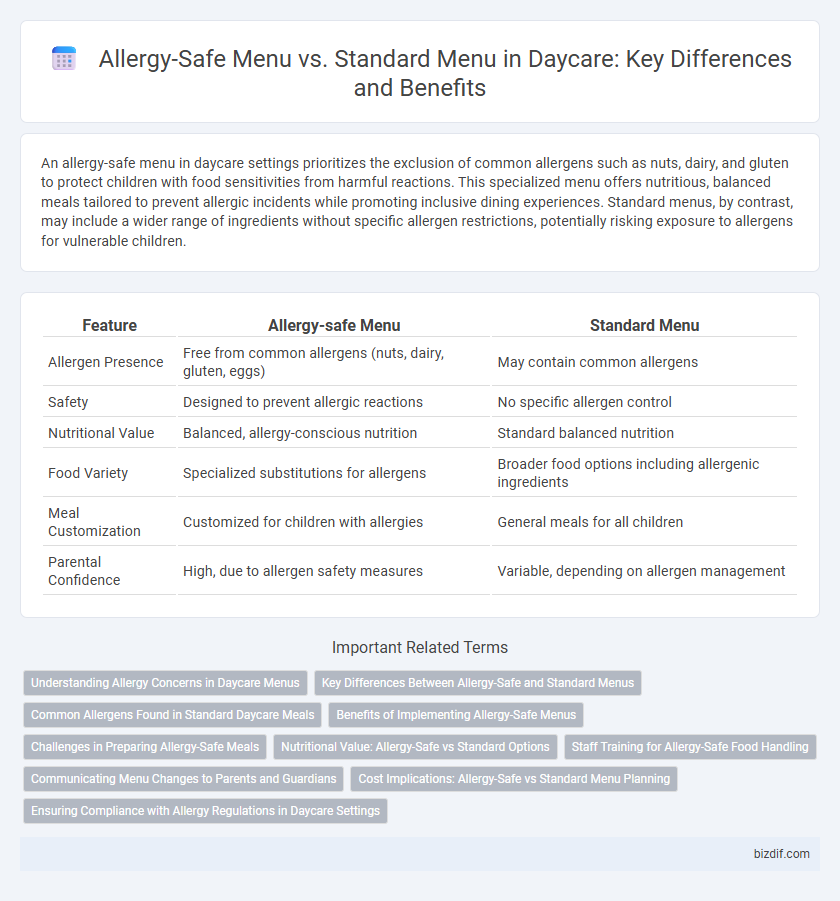An allergy-safe menu in daycare settings prioritizes the exclusion of common allergens such as nuts, dairy, and gluten to protect children with food sensitivities from harmful reactions. This specialized menu offers nutritious, balanced meals tailored to prevent allergic incidents while promoting inclusive dining experiences. Standard menus, by contrast, may include a wider range of ingredients without specific allergen restrictions, potentially risking exposure to allergens for vulnerable children.
Table of Comparison
| Feature | Allergy-safe Menu | Standard Menu |
|---|---|---|
| Allergen Presence | Free from common allergens (nuts, dairy, gluten, eggs) | May contain common allergens |
| Safety | Designed to prevent allergic reactions | No specific allergen control |
| Nutritional Value | Balanced, allergy-conscious nutrition | Standard balanced nutrition |
| Food Variety | Specialized substitutions for allergens | Broader food options including allergenic ingredients |
| Meal Customization | Customized for children with allergies | General meals for all children |
| Parental Confidence | High, due to allergen safety measures | Variable, depending on allergen management |
Understanding Allergy Concerns in Daycare Menus
Understanding allergy concerns in daycare menus ensures the safety and well-being of children with food allergies by tailoring meals to avoid common allergens like nuts, dairy, and gluten. An allergy-safe menu eliminates potential exposure risks through strict ingredient controls and cross-contamination prevention, promoting inclusion and peace of mind for parents and caregivers. Compared to a standard menu, an allergy-safe menu requires rigorous staff training and clear communication about child-specific dietary restrictions.
Key Differences Between Allergy-Safe and Standard Menus
Allergy-safe menus in daycare settings prioritize eliminating common allergens such as peanuts, tree nuts, dairy, eggs, soy, wheat, fish, and shellfish to prevent allergic reactions among children. Standard menus often include a wider variety of foods without specific allergen restrictions, increasing the risk of exposure for sensitive individuals. Key differences include ingredient selection, cross-contamination prevention protocols, and labeling practices to ensure safety and awareness.
Common Allergens Found in Standard Daycare Meals
Standard daycare meals frequently contain common allergens such as peanuts, tree nuts, dairy, eggs, wheat, soy, fish, and shellfish, posing risks for children with food allergies. An allergy-safe menu eliminates these ingredients, substituting safe alternatives like oat or rice milk, seed butters, and gluten-free grains to prevent allergic reactions. Implementing allergy-safe menus ensures a safer dining environment, reduces emergency incidents, and supports inclusive nutrition for all children.
Benefits of Implementing Allergy-Safe Menus
Implementing allergy-safe menus in daycare settings significantly reduces the risk of allergic reactions, ensuring the safety and well-being of children with food allergies. These specialized menus minimize cross-contamination by using carefully screened ingredients and dedicated preparation areas, fostering a safer eating environment. Allergy-safe menus also promote inclusivity, allowing all children to participate in mealtime without fear, supporting both caregivers' confidence and parents' peace of mind.
Challenges in Preparing Allergy-Safe Meals
Preparing allergy-safe meals in daycare settings requires meticulous ingredient verification to prevent cross-contamination and allergic reactions, demanding strict adherence to dietary guidelines. Staff must be thoroughly trained in identifying common allergens such as peanuts, dairy, and gluten, which increases operational complexity compared to standard menus. Menu planning involves sourcing specialized allergen-free ingredients, often leading to higher costs and logistical challenges in procurement and kitchen management.
Nutritional Value: Allergy-Safe vs Standard Options
Allergy-safe menus in daycare settings prioritize nutrition by carefully excluding common allergens while ensuring balanced intake of essential vitamins, minerals, and macronutrients tailored to children's dietary restrictions. Standard menus often include a wider variety of ingredients, potentially providing broader nutrient diversity but posing risks for allergic reactions in sensitive children. Both menu types strive to support healthy growth, but allergy-safe options emphasize safety without compromising key nutritional requirements.
Staff Training for Allergy-Safe Food Handling
Staff training for allergy-safe food handling in daycare centers emphasizes strict protocols to prevent cross-contamination and ensure accurate ingredient awareness, minimizing allergic reactions among children. Specialized training covers identifying common allergens, proper cleaning procedures, and emergency response actions to maintain a safe allergy-safe menu environment. This focused education significantly enhances the safety and trustworthiness of allergy-safe menus compared to standard menus lacking dedicated allergy management.
Communicating Menu Changes to Parents and Guardians
Clear communication of allergy-safe menu updates to parents and guardians is crucial for ensuring children's safety in daycare settings. Detailed notifications should highlight ingredient substitutions and cross-contamination precautions to build trust and prevent allergic reactions. Providing transparent, accessible menu information supports informed decision-making and reinforces the daycare's commitment to child health and safety.
Cost Implications: Allergy-Safe vs Standard Menu Planning
Implementing an allergy-safe menu in daycare settings typically incurs higher food procurement costs due to the need for specialized ingredients and strict cross-contamination controls. Standard menu planning often benefits from bulk purchasing and less expensive, widely available ingredients, reducing overall expenses. Careful budgeting for allergy-safe menus must account for these increased costs while ensuring nutritional adequacy and safety for all children.
Ensuring Compliance with Allergy Regulations in Daycare Settings
An allergy-safe menu in daycare centers ensures strict adherence to local and national allergy regulations by eliminating common allergens such as peanuts, dairy, and gluten, thereby minimizing the risk of allergic reactions. Unlike standard menus, allergy-safe menus require detailed ingredient disclosure and cross-contact prevention protocols to maintain a safe eating environment for children with allergies. Implementing these measures aligns daycare providers with health and safety standards, protecting vulnerable children and reducing liability.
Allergy-safe Menu vs Standard Menu Infographic

 bizdif.com
bizdif.com